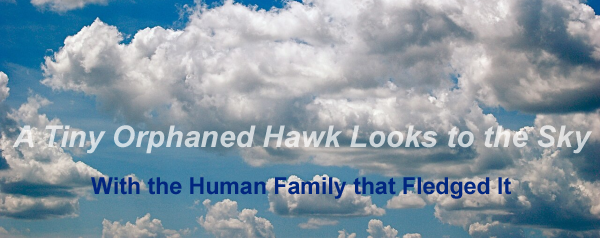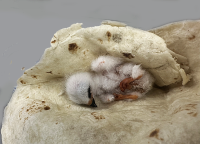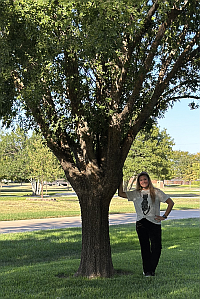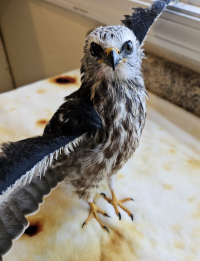
"Our liberty cannot be guarded but by the freedom of the press, nor that be limited without danger of losing it."Thomas Jefferson, 1786

 | ||
| by Sammie Ann Wicks Noticias Southwest Senior Correspondent |
|
She thought it was a wisp of cotton or a tiny scrap of paper on the lawn leading to her back yard. "I told Kristi, my best friend, 'Oh, I better pick that up before Shea sees it,'" Amarillo resident Katie Adlong chuckles, referencing her husband's legendary pride in his home's well-tended yard. "That day, we were having a Bratwurst broil around the pool, and I kept seeing all these hawks flying around," Adlong recalls. "And sometimes that makes me nervous, because I have a dog." The hawks overhead reminded Adlong she had wanted to show her friend a larger-than-average birds' nest in a tree at her rear property, and the two left the barbecue and headed back. On the way, Adlong bent down to collect the debris she'd seen--and it moved. |
 |
| "It just kind of rustled," says Adlong, "so I startled--and it was chirping. Then I saw it was a tiny baby bird." So tiny, in fact, that Adlong wondered, with good reason, if the little creature might be a hatching. "It didn't try to get up on its legs," Adlong says, "and just kind of laid there. But it didn't seem hurt or anything. "So I picked it up and held it, and told Kristi, 'It's a bird.' And she said, 'What?'" The two young women continued to gently examine the chick, and mulled over what to do for it. "I have to help it, I have to keep it, there's no other birds around," Adlong worried. "And Kristi said, 'You can't keep it. It's wild. What can you even do for it.?'" "Well, I wasn't going to be talked out of it," Adlong vowed, and started to glean internet pages to try and identify the tiny bird's species. After viewing a few photos, Adlong and her friend concluded their foundling was a Barn Owl. Moments later, Adlong's husband skewered a few roasted sausages on his grilling fork, and held them up invitingly. "Go get a plate," he called to the two friends. Adlong shook her head negatively. "I said, 'No! It'll die,'" Adlong declared. In Adlong's compassionate mind, it appears, destiny had arrived: she sighed and looked down again at the orphaned bird she'd befriended. "I think I just became a bird mom," Adlong told her friend, laughing.
"I think I just became
"Time was passing, and I knew I had to keep it warm," Adlong mused. But how? she thought.
"I looked over at my husband at the grill, where he was keeping some tortillas warm," Adlong says, "and told him to hand me one."
Tortilla in hand, Adlong again gently grasped the tiny chick.
"I wrapped the baby in the tortilla," Adlong says. "I swaddled her."
|
 The hatchling Kite rescued by Amarillo's Katie Adlong, safe and sound asleep in a warm tortilla. |
The women were again moved to ensure the chick survived, and took action, revisiting the website where they had first looked for information. A website and local phone number popped up. "Right there, the number for the Wildlife Center (Amarillo's Wild West Wildlife Rehabilitation Center) here in town came up," Adlong remembers. "And we phoned in." The staff at the Center answered immediately, Adlong says, and calmly began to give Adlong and her friend instructions. "She told us it was OK to touch it, and not to put it in a warm box," says Adlong. "Then she said, 'We're en route now.' And it wasn't even five minutes and they were here, and took over. We were so impressed." But the rescuers also were able to immediately identify the foundling. "The staff person said, 'This is no Barn Owl,'" says Adlong. "'This is a Kite. A Missouri Kite. A type of hawk--a raptor.' And we were amazed."
|
(Photo courtesy Katie Adlong) |
 |
(Photo courtesy Amarillo Wildlife Center) |
 |
The Center's founder, Stephanie Brady, told Noticias Southwest she has spent the last 32 years "raising kids and feeding animals," and considers animal welfare her "sacred calling."
Since its founding in 2016 on a proverbial shoestring budget in a used, distressed mobile home, the Center now enjoys worldwide acclaim, and regularly interfaces with other city, regional, state, and national animal welfare groups and other allied organizations.
The Center benefits from many dedicated, well-informed, and well-trained volunteers, and shelters and cares for mammals, snakes, and birds, and other wildlife as may appear.
Noticias Southwest urges our readers to volunteer with, donate to, and support this worthy organization.
Call them at 806-680-2483, or go online at:
https://www.wildwestwildlife.com
(Check back next month for our full article on the Center.)
|